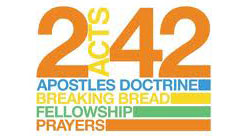I’m writing this just a week after we celebrated Pentecost Sunday. Acts 2:1-4 tells of the first day of Pentecost for the young church and chapters 2-7 record the immediate aftermath. All Christian churches have no option but to recognize that the event did happen though there are different theories and theologies about its relevance to the individual today.
 Some see Pentecost as the one-off push to fulfill the Great Commission of taking the good news to the whole world, and it was a great start with “about 3,000 souls” added to the church and soon after another 5,000 souls. Pentecostals and most charismatics see it as the next step after salvation that all believers need to seek after by “tarrying” in prayer as in Luke 24:49. Other charismatics see it as a one-off event that makes it possible for all believers throughout the church age to receive by faith “the gift of the Holy Spirit.” Many see it as the birthday of the Church.
Some see Pentecost as the one-off push to fulfill the Great Commission of taking the good news to the whole world, and it was a great start with “about 3,000 souls” added to the church and soon after another 5,000 souls. Pentecostals and most charismatics see it as the next step after salvation that all believers need to seek after by “tarrying” in prayer as in Luke 24:49. Other charismatics see it as a one-off event that makes it possible for all believers throughout the church age to receive by faith “the gift of the Holy Spirit.” Many see it as the birthday of the Church.
I want to first look at a summary statement of perhaps the first few weeks after Pentecost, as given in Acts 2:42: “And they devoted themselves to the apostles’ teaching and the fellowship, to the breaking of bread and the prayers” (ESV). You can read the whole section down the end of the chapter, verse 47. The many repetitions of the word “and” (KJV) encourage us to slowly work through each statement to understand their full impact.
“They devoted themselves to the apostles’ teaching…;” “they continued stedfastly” (KJV). There’s the secret of the early church. It was not a system of daily devotions but people devoted to the apostles’ teaching from the Word of God. They were hungry to hear the “proven truth, not peripheral truth.” They were after the apostles’ teaching, not the teaching from the self-proclaimed super-spiritual person or the young in the faith believer who has just discovered a fascinating verse. And they not only wanted to learn what the Lord had said but they wanted to do the signs and wonders that the Lord had done.
Just a few weeks earlier the twelve apostles had heard the Great Commission from the lips of Jesus. “Go therefore and make disciples The “sound doctrine [teaching]” of I Timothy 1:10 and the “pattern of sound words” of II Timothy 1:13 was music to their ears. Just around the corner were difficult times, “For the time is coming when people will not endure sound teaching, but having itching ears they will accumulate for themselves teachers to suit their own passions, and will turn away from listening to the truth and wander off into myths” (II Timothy 4:3-4) And those days are well and truly established in the 21st century church. — To be continued.



Leave A Comment